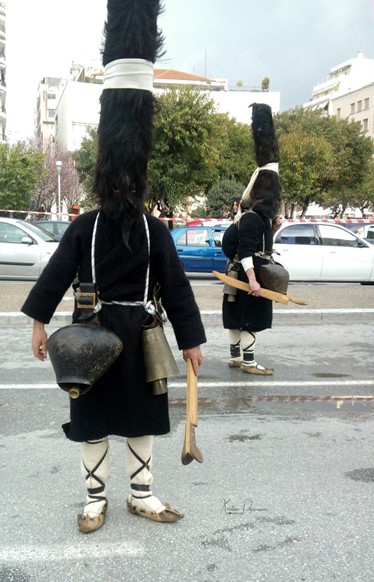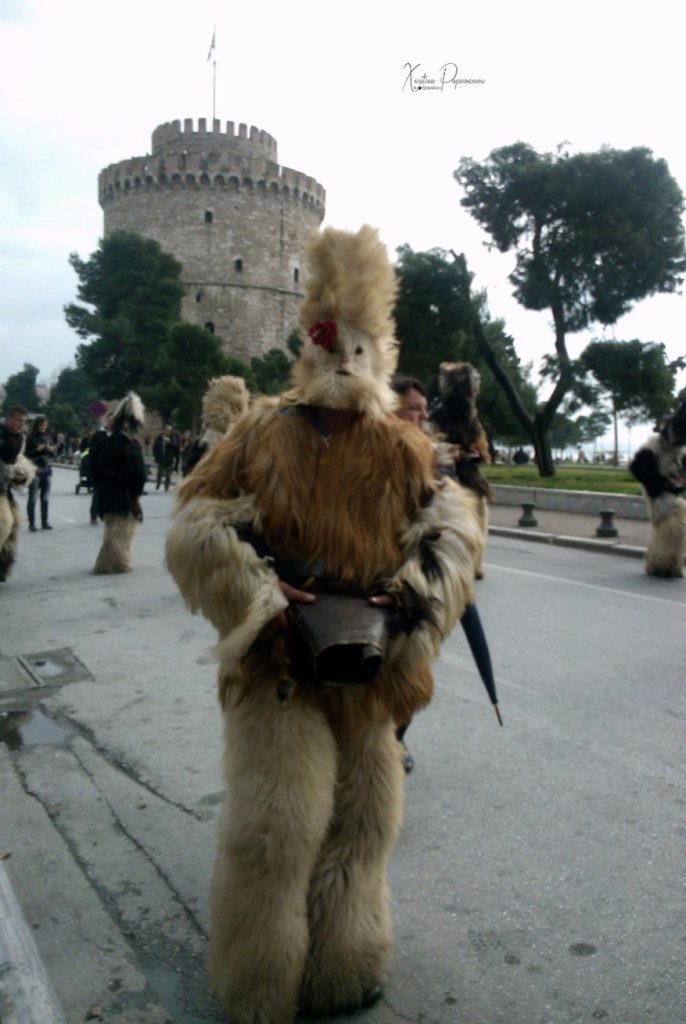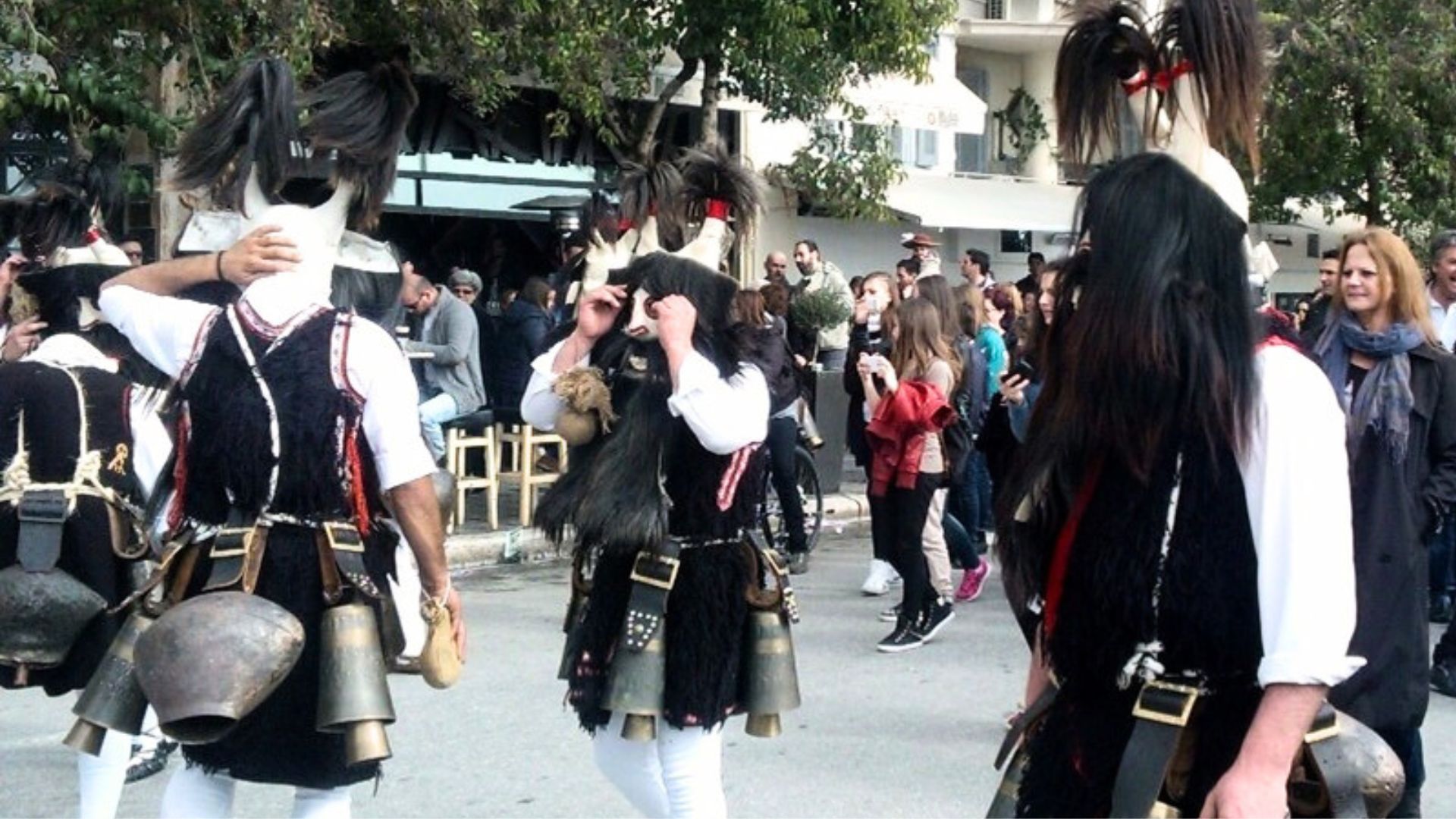By Marina Siskos
Carnival celebrations in Greece vary notoriously across the country. Different regions, ascribe significance to various aspects of the celebration, from the historic, cultural, and symbolic elements of it, rendering it, one of the most motley festivals of the country. The highly inhomogeneous population of Greece confers to the variance for the ways we celebrate the Carnival and anticipate the Holy Easter.
Some common elements that run through most celebrations, are the Carnival’s origin from god Dionysus, the custom of disguise into imaginary, animal or real entities, the evasion from social courtesy, the abolition of social norms and boundaries, the upheaval of the status quo, which also summarises the ritualistic spirit of the celebration.
In Ancient Greece, god Dionysus, the child of Zeus and Semeli – who, according to the legend, was born twice, the first time as a semi-god and the second time in fully divine status – was honored in the temple of Zeus. The celebration was accompanied by meat-eating coming from the sacrifices to the God, and abundant wine.
The theatrical element is pronounced in the celebration of Dionysus. During the Greek Dionysia, the holiday in honour of the god Dionysus, apart from strictly ‘religious’ rites, theatrical performances were also organised.
Mask is the fundamental element of the celebration
The spirit of Dionysus was propagated and survived, preserving the fundamental element of the celebration: the mask. This was the case until the Christian times, when it was renamed as Apokrea: the word means the repudiation of meat at the reception of the Lent. Many scholars believe that Christmas and Carnival traditions were based on the Roman Saturnalia. Carnival, as the fun time preceding the Christian period of the Lent, was popularised in Europe during the Middle Ages.
Disruption of social status
The antithetic behavior of the carnivalesque festivals, intends to dissolve social conventions, only to fortify them later. The cultural props that accompany the Carnival, are masks, disguises, and the maypole. The carnival season lasts three weeks: the first, is the Propone (from ‘prophono,’ to address, to announce), as carnival is announced. The second is the ‘Meat week,’ and the last one, the ‘Cheese week,’ an introduction to the Lenten fast.

Thrace, ‘The burning of Jaros’
The land of god Dionysus, Thrace, becomes a vibrant Carnival destination with talented masqueraders, and a sequence of traditional rites and rituals, skillfully dramatised. In the traditional town of Xanthi, people preserve the age-old custom of “Jaros burning.”
It seems that burning, holds a unique symbolic place in the celebration. It may signify the will to leave the past behind and clear the path for the new that is to come. The “Jaros” is a figurine that is burnt upon a pile of holly oaks. The ritual is performed to scatter the evil, in this case the flees that used to plague rural Greece during the summer. The custom dates back to the village of Samakov, Eastern Thrace, and is reenacted every year in the homonymous village.
‘Kiopek Mpehis (Κιοπέκ Μπέης)’
In the Kiopek Mpehis custom, the elements of satire and the humiliation of the Ottoman conqueror are prevalent. In reenacting the custom, the tyrant, personified by the wealthy lord, the “Mpehis,” is met with resistance and sedition, raised by the locals.
Satire and swindle are the core functions relived in the folklore ritual of Kiopek Mpehis and the Monks, Houhoutos or the King, which are essentially the same practice, in several other places, emphasising the injustice plagued by the conqueror, on the one side, and to the skillful resistance, on the other side. The incarnated functions are left intact, despite any superficial additions and regional differentiations – the name, the roles (dramatis personae), the disguises.
Kiopek Mpehis is bequest by refugee ancestors and survives as an active memento of the Thracian peoples’ strong social unity, as is evidenced through history.

Papaioannou Christina (@papaioannou_xristina) • Φωτογραφίες και βίντεο στο Instagram
Naoussa, “Janissaries and Boules”
Rooted in ancient Dionysus’ rituals, the traditional event of “Janissaries and Boules” is revived during the Apokrea in the city of Naoussa.
According to historical records, 1706 has probably been the first time the ritual was held. It narrates a story of resistance against the inhumane practice of the devshirme, the massive kidnapping of young boys by the Ottoman army across the Balkans. The people of Naoussa, resisted the devshirme by killing the sultan’s emissary. Then, most men became kleftes, inhabiting the mountains. The custom was established as part of the carnival as the time of the rebellion took place during the Apokrea. The following year, the young men returned to the city of Naoussa, masked, so that they wouldn’t be recognised by the Turks and armored by silverware to protect their pectoral area. This dressing habit instilled the exquisite aesthetic and the neat appearance of the disguised.
The custom of “Janissaries” is honoured, accompanied by the traditional zurna and the davul. Early in the morning of Sunday of Apokrea, the participants rise to get ready for the march. The gathering of the village is signaled by the solemn sound of the zurna and the heavy beating of the davul.
The importance of tradition
Of the many customs bequeathed from our ancestry, eventually only a few survive. Others fade away, whereas others are systematically repressed by the collective memory. The rituals by which communities negotiate symbols of itself in the Carnival is complex and intriguing. Carnival is about shared stories and only the stories that are substantial to our contemporary narrative survive.
Bibliography
- Δάλλη, Π. Οι Απόκριες στη Σμύρνη και την Ερυθραία. Μνήμες Ελληνισμού. Οι Απόκριες στη Σμύρνη και την Ερυθραία — Μνήμες Ελληνισμού (mnimesellinismou.com).
- Newsroom Iefimerida(2024). Αποκριά, το έθιμο με τις βαθύτερες ρίζες: από τον διονυσιασμό στα ξόανα κα τα άρματα του καρνάβαλου. Αποκριά, το έθιμο με τις βαθύτερες ρίζες -Από τον διονυσιασμό στα ξόανα και τα άρματα του καρνάβαλου – iefimerida.gr
- Cudny, W. (2014). The Phenomenon of Festivals: Their Origins, Evolution, and Classifications. Anthropos, 109(2), 640–656. http://www.jstor.org/stable/43861801.
- Halland, E.J. (2012). From Modern Greek Carnivals to the Masks of Dionysos and other Divinities in Ancient Greece. Nar. Umjet. 49/1,2012,p.p.113-130.
- Σαν Σήμερα. Το Έθιμο του Μπέη. Αφιερώματα. Λαογραφία. Το έθιμο του Μπέη – Αφιέρωμα –sansimera.gr.
- Σαν Σήμερα. Γενίτσαροι και Μπούλες: Το αποκριάτικο έθιμο της Νάουσας. Σαν Σήμερα. Το Έθιμο του Μπέη. Αφιερώματα. Λαογραφία. Το έθιμο του Μπέη – Αφιέρωμα – Σαν Σήμερα .gr (sansimera.gr).

